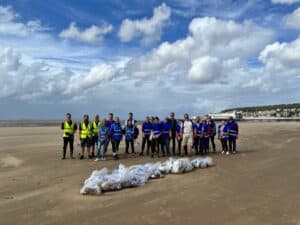On Tuesday 6 September, Lee, Nathan and Chris from the Printwaste team volunteered to help Life’s a Beach for the third time to support them in their mission to eradicate single-use plastics from Britain’s beaches and waterways. This time the team were at Weston-Super-Mare, a short drive from the company’s HQ. The two-mile stretch of sand was covered by a plethora of volunteers from both ProCook (22) and Printwaste (3). The aim was to improve the beach for local residents and visitors as well as improving the habitat for local wildlife by removing unwanted waste of any description.

What we did
Printwaste is a specialist in the collection and management of waste. We were able to support the Life’s a Beach team through providing water- resistant polythene bags for all volunteers, collecting as much waste from the local area as possible and then transporting the waste back to our Cheltenham depot to be weighed, sorted and treated.
Some of the interesting items found on the day included:
- Three lightbulbs
- A pair of shoes
- A full bottle of mayonnaise
- A badminton shuttlecock
- A pair of large scissors
- Part of a car exhaust
- And a teddy bear
The results
Once back at Printwaste HQ, the collected waste was placed on the weighbridge which confirmed that the team had collected 80kg of general waste in just two hours. Due to the levels of high contamination, the most environmentally friendly and sustainable option is to turn the waste into electricity through Printwaste’s waste-to-energy recovery process.
Converting non-recyclable waste to energy not only generates electricity for the national grid but the process also minimises carbon emissions, through filtration techniques, and creates a bi-product that can be re-purposed for the construction industry. The process is continually monitored to ensure it complies with the EU’s Waste Incineration Directive.
80kg is roughly the equivalent of a commercial-sized 1100L bin of general waste. 80kg will produce 50 kWh of electricity enough to make 4,000 cups of tea or coffee – based on a standard mug size.
To find out more about Life’s a Beach and the work they do, please visit their website.
